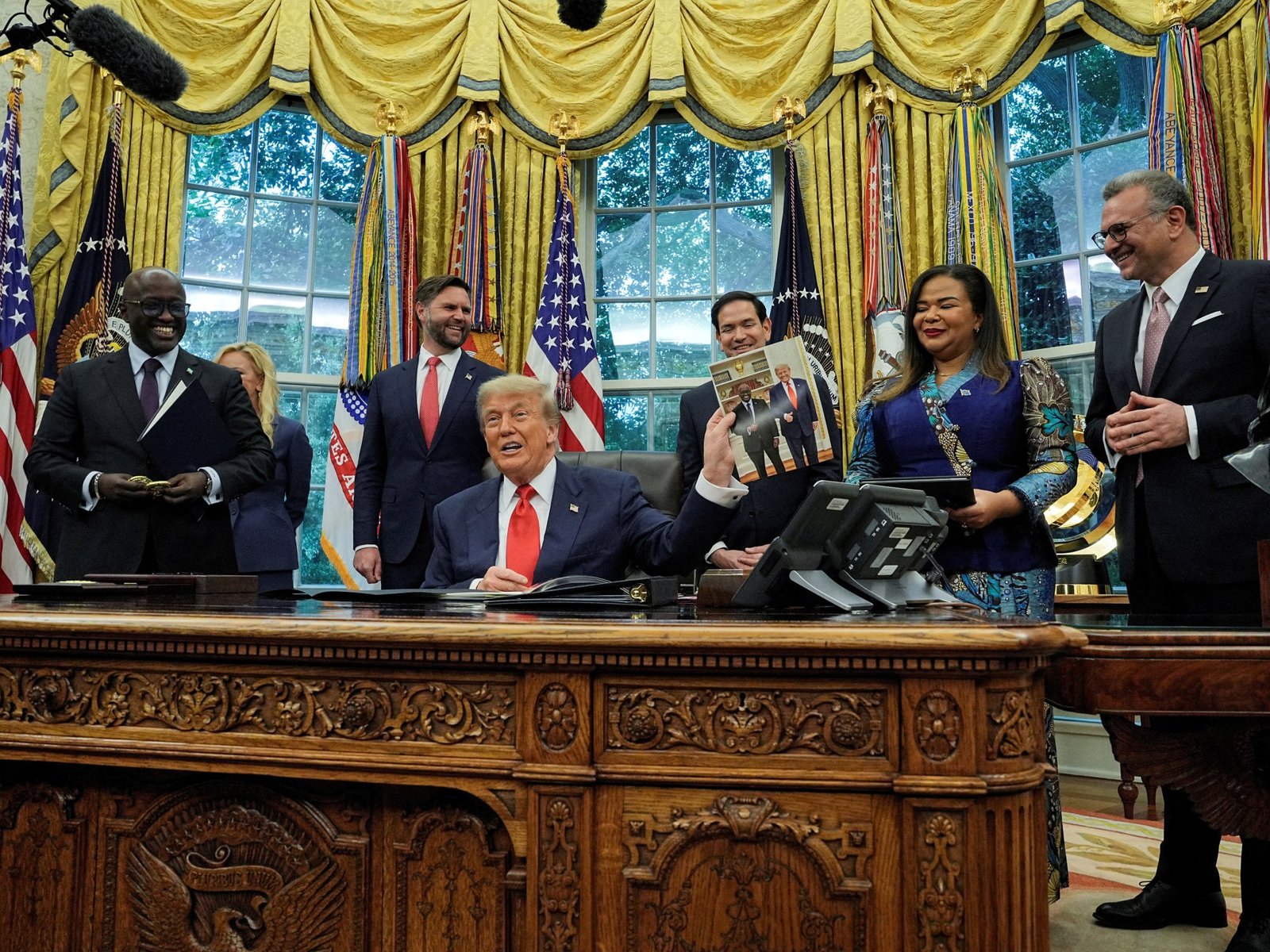On August 5, 2025, Rwanda made headlines by agreeing to accept 250 migrants as part of a controversial third-country deportation strategy initiated during the Trump administration.
Yolande Makolo, the spokesperson for the Rwandan government, emphasized that her country would retain the autonomy to select which deportees to admit for “resettlement”, promising them training, healthcare, and housing to assist in their efforts to “rebuild their lives.”
This initiative is a component of President Trump’s contentious goal to implement “the largest deportation operation in American history,” and marks the third such agreement involving African nations.
Earlier, on July 16, the U.S. deported five individuals convicted of crimes in their home countries—including Vietnam, Jamaica, Laos, Cuba, and Yemen—to Eswatini, previously known as Swaziland. These individuals, labeled as “barbaric and violent” by their nations, are currently confined in isolated units at the Matsapha Correctional Complex, awaiting potential repatriation.
Just eleven days prior, on July 5, eight men with convictions for serious offenses such as murder and sexual assault were sent to South Sudan, although reports vary on whether any of these individuals are South Sudanese citizens.
The public outcry against these deportations has been substantial, with civil society organizations in Eswatini and legal professionals in South Sudan denouncing them as unlawful. South Africa’s government has also formally protested these actions to Eswatini.
Meanwhile, Nigeria has firmly rejected U.S. pressure to accept 300 Venezuelan migrants, with Foreign Minister Yusuf Tuggar stating that the nation faces significant challenges of its own with “over 230 million people” to support.
Critics argue that these arrangements are inherently unjust, characterizing the U.S. approach as strong-arming nations at the cost of vulnerable human lives. The harsh realities of Trump’s administration, including family separations in 2019 that traumatized numerous children, starkly reflect a disregard for human dignity.
The U.S. is now seemingly transferring individuals to countries like Rwanda, Eswatini, and South Sudan, which are already grappling with significant hardships in supporting their own citizens. This stance underscores a problematic perception of Africa as a “dark” continent inferentially rendered incapable of empathy or partnership, a viewpoint reminiscent of colonial narratives.
Despite facing numerous challenges, Africa’s resilience is evident. Uganda, for example, currently hosts around 1.7 million refugees, surpassing the total refugee populations managed by the UK, France, and Belgium combined. It’s imperative for European nations to shoulder a more significant part of the responsibilities associated with asylum seekers and refugees.
Such third-country deportation deals are not credible; they echo historical colonial practices. No self-respecting African leader should endorse such an organised socio-political atrocity, especially given the ongoing struggles tied to the historical wounds imposed by colonial powers, exemplified by civil unrest in places like South Sudan and economic exploitation in Nigeria’s Delta region.
Current U.S. plans to ship both convicted criminals and vulnerable asylum seekers overseas represent a continued legacy of colonialism, repackaged for modern times. This contrasts sharply with the pressing needs to provide rehabilitation and safety within American borders.
If the U.S. persists in dispatching individuals overseas, then Europe, rather than Africa, should bear the brunt of its decisions. Nations like Rwanda, Eswatini, and South Sudan rank among the world’s poorest, unable and unjustly pressured to shoulder the consequences of American policies.
A comprehensive study published in May 2025, “Unequal Exchange and North-South Relations” by Gaston Nievas and Thomas Piketty, highlights the historical economic exploitation that underlined European wealth accumulation, laying bare colonial legacies that continue to fuel global imbalances.
The situations in Juba and Kigali illustrate that the repercussions of colonialism persist in shaping global dynamics. Accepting the resurgence of exploitative extraction and disposal strategies reminiscent of the Berlin Conference of 1885 is unacceptable.
Even if public statements from Rwanda, South Sudan, or Eswatini suggest otherwise, the act of relocating America’s marginalized populations to Africa is a modern form of colonial exploitation.
This strategy is not unprecedented. Historically, colonial powers relegated territories to function as offshore penal colonies. France, for example, dispatched convicts to regions like present-day Gabon, while Spain used Bioko Island as a settlement for Cuban deportees.
The U.S.’s revival of these practices adds further complexity to the already strained dynamics between Africa and America, especially considering that many individuals seeking refuge in the U.S. come from countries marked by the long shadows of colonial rule and subsequent U.S. interventions.
Yet, despite the historical context, the West often evades accountability for its actions. European nations have reaped considerable benefits from their colonial pasts, boasting well-resourced welfare and healthcare systems founded on exploitative practices.
These countries possess both the means and, more importantly, the historical responsibility to provide support for deportees. They have actively participated in destabilising sovereign nations across Africa and beyond, resulting in waves of refugees fleeing the very turmoil instigated by foreign policies, often disregarded or dismissed by those in power.
Contrary to this, Africa adheres to international laws, upholding sovereignty and striving for peace while shackled to colonial debts. The hypocrisy in expecting Africa to manage the repercussions of colonial actions while the West disregards its obligations is palpable.
As the people of Africa continue to navigate systemic oppression, it is pivotal to reject complicity in these injustices. Western interventions frequently sow seeds of poverty, displacement, and instability across the Global South.
If the U.S. is intent on exporting its deportees, let these individuals be sent to those who have historically profited from these systems of oppression.
Europe must confront its past and present choices without drawing Africa into the fray. Let the responsibility of Trump’s deportees rest on the shoulders of Europe.
The opinions shared in this article are those of the author and do not necessarily represent the editorial stance of Al Jazeera.

